|
|
|
Sort Order |
|
|
|
Items / Page
|
|
|
|
|
|
|
| Srl | Item |
| 1 |
ID:
168183
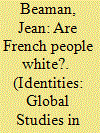

|
|
|
|
|
| Summary/Abstract |
Based on ethnographic research of France’s North African second-generation, I bring together literatures on racial formation, whiteness, and race and racism in Europe to discuss how whiteness operates in French society. I discuss how respondents must navigate a supposedly colorblind society in which whiteness is default. Because these individuals are racialized as non-white, they are not seen as French by others. I discuss how they wrestle with definitions of French identity as white and full belonging in French society as centered on whiteness. I argue that salience of whiteness is part of France’s racial project in which differences among individuals are marked without explicit state-sanctioned racial and ethnic categories. This has implications for considering how whiteness is crucial to understanding European identity more broadly, including through the rise of the Far-Right, the recent Brexit and Leave campaigns, and anti-immigration sentiment throughout Western Europe.
|
|
|
|
|
|
|
|
|
|
|
|
|
|
|
|
| 2 |
ID:
167649
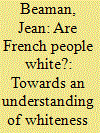

|
|
|
|
|
| Summary/Abstract |
Based on ethnographic research of France’s North African second-generation, I bring together literatures on racial formation, whiteness, and race and racism in Europe to discuss how whiteness operates in French society. I discuss how respondents must navigate a supposedly colorblind society in which whiteness is default. Because these individuals are racialized as non-white, they are not seen as French by others. I discuss how they wrestle with definitions of French identity as white and full belonging in French society as centered on whiteness. I argue that salience of whiteness is part of France’s racial project in which differences among individuals are marked without explicit state-sanctioned racial and ethnic categories. This has implications for considering how whiteness is crucial to understanding European identity more broadly, including through the rise of the Far-Right, the recent Brexit and Leave campaigns, and anti-immigration sentiment throughout Western Europe.
|
|
|
|
|
|
|
|
|
|
|
|
|
|
|
|
| 3 |
ID:
167648


|
|
|
|
|
| Summary/Abstract |
Recent research has introduced the notion of fractal logic as a way of rethinking racialization and ideas and practices of nationhood. We have claimed elsewhere that racial reasoning instantiates a specific fractal logic called the nation in danger, which can be found in circulating images, soundbites, visual signs, metaphors, and narratives created in political communication, news media, and everyday conversations. In these studies, human reasoning is approached as fractals, which implies that the same structure appears self-similarly at different levels. This article examines the nation in danger as a basis for aggressive exclusionary reasoning and practices. Two Danish media events from 2016 are looked at: the segregation of swim classes and the new segregation of schools according to ‘nationality’ and ‘ethnicity.’ By using fractal logic, the nation in danger operates recurrently at different levels and, consequently, constitutes a form of naturalization of the white nationalism that saturates Danish racial reasoning and public debate.
|
|
|
|
|
|
|
|
|
|
|
|
|
|
|
|
| 4 |
ID:
168182


|
|
|
|
|
| Summary/Abstract |
Recent research has introduced the notion of fractal logic as a way of rethinking racialization and ideas and practices of nationhood. We have claimed elsewhere that racial reasoning instantiates a specific fractal logic called the nation in danger, which can be found in circulating images, soundbites, visual signs, metaphors, and narratives created in political communication, news media, and everyday conversations. In these studies, human reasoning is approached as fractals, which implies that the same structure appears self-similarly at different levels. This article examines the nation in danger as a basis for aggressive exclusionary reasoning and practices. Two Danish media events from 2016 are looked at: the segregation of swim classes and the new segregation of schools according to ‘nationality’ and ‘ethnicity.’ By using fractal logic, the nation in danger operates recurrently at different levels and, consequently, constitutes a form of naturalization of the white nationalism that saturates Danish racial reasoning and public debate.
|
|
|
|
|
|
|
|
|
|
|
|
|
|
|
|
| 5 |
ID:
168187
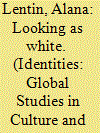

|
|
|
|
|
| Summary/Abstract |
Smartphone apps for anti-racism education and intervention are being developed by organisations in various countries. The ubiquity of smartphone use and app methodology, as Grant argues, have the potential to disrupt racial knowledges and facilitate anti-racist action. I use Nicholas Mirzoeff’s ‘zones of appearance and non-appearance’ and Derek Hook’s discussion of ‘racialising embodiment’ to discuss the potential of one such app, Everyday Racism, to challenge and disrupt white supremacy. The Australian-based app uses gamification to encourage users to participate in ‘bystander anti-racism’. However, by failing to question the neutrality of the default white bystander, the app risks reproducing hegemonic constellations of white agency versus racialized inaction. I argue that, in the zone of appearance, it is not enough to make racism apparent. It is necessary to appear. To appear first requires exposing nonappearance including the role even of the well-intentioned in maintaining it.
|
|
|
|
|
|
|
|
|
|
|
|
|
|
|
|
| 6 |
ID:
167653
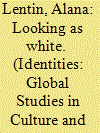

|
|
|
|
|
| Summary/Abstract |
Smartphone apps for anti-racism education and intervention are being developed by organisations in various countries. The ubiquity of smartphone use and app methodology, as Grant argues, have the potential to disrupt racial knowledges and facilitate anti-racist action. I use Nicholas Mirzoeff’s ‘zones of appearance and non-appearance’ and Derek Hook’s discussion of ‘racialising embodiment’ to discuss the potential of one such app, Everyday Racism, to challenge and disrupt white supremacy. The Australian-based app uses gamification to encourage users to participate in ‘bystander anti-racism’. However, by failing to question the neutrality of the default white bystander, the app risks reproducing hegemonic constellations of white agency versus racialized inaction. I argue that, in the zone of appearance, it is not enough to make racism apparent. It is necessary to appear. To appear first requires exposing nonappearance including the role even of the well-intentioned in maintaining it
|
|
|
|
|
|
|
|
|
|
|
|
|
|
|
|
| 7 |
ID:
168185


|
|
|
|
|
| Summary/Abstract |
This paper explores strategies deployed by a sample of white, British-born South Africans to account for their positions during apartheid and post-apartheid. Whereas literature on white racism identifies denial as a key strategy towards racial discrimination and the maintenance of privilege, the historical and political 10 context of South Africa makes this tactic implausible. The paper contributes to understandings of pluralism within white identifications through investigation of diverse discursive strategies used to frame the overtly racist, apartheid regime and the present post-apartheid, supposedly, ‘post-race’ state. A range of positions attempting to minimise individual implication are identified. 15 A common feature however is to reimagine the structure of social relations in order to diminish responsibility for the sins of the past or the success of the future; suggesting profound difficulties in adjusting to the new social reality.
|
|
|
|
|
|
|
|
|
|
|
|
|
|
|
|
| 8 |
ID:
167651


|
|
|
|
|
| Summary/Abstract |
This paper explores strategies deployed by a sample of white, British-born South Africans to account for their positions during apartheid and post-apartheid. Whereas literature on white racism identifies denial as a key strategy towards racial discrimination and the maintenance of privilege, the historical and political 10 context of South Africa makes this tactic implausible. The paper contributes to understandings of pluralism within white identifications through investigation of diverse discursive strategies used to frame the overtly racist, apartheid regime and the present post-apartheid, supposedly, ‘post-race’ state. A range of positions attempting to minimise individual implication are identified. 15 A common feature however is to reimagine the structure of social relations in order to diminish responsibility for the sins of the past or the success of the future; suggesting profound difficulties in adjusting to the new social reality.
|
|
|
|
|
|
|
|
|
|
|
|
|
|
|
|
| 9 |
ID:
167652


|
|
|
|
|
| Summary/Abstract |
This article revisits Critical Race Theory and brings it’s explanatory capacity to bear on the contemporary racialization of Muslims in Europe, most specifically the experience of British Muslim communities in education. The article argues that CRT can provide a theoretically fruitful means of gauging the ways in which anti-Muslim discrimination might be engendered through various strategies around securitization. In a social and political context characterized by a hyper-vigilance of Muslim educators in particular, the article concludes that applying CRT allows us to explore how a general latent whiteness is given political content through a particular racialization of Muslims.
|
|
|
|
|
|
|
|
|
|
|
|
|
|
|
|
| 10 |
ID:
168186


|
|
|
|
|
| Summary/Abstract |
This article revisits Critical Race Theory and brings it’s explanatory capacity to bear on the contemporary racialization of Muslims in Europe, most specifically the experience of British Muslim communities in education. The article argues that CRT can provide a theoretically fruitful means of gauging the ways in which anti-Muslim discrimination might be engendered through various strategies around securitization. In a social and political context characterized by a hyper-vigilance of Muslim educators in particular, the article concludes that applying CRT allows us to explore how a general latent whiteness is given political content through a particular racialization of Muslims.
|
|
|
|
|
|
|
|
|
|
|
|
|
|
|
|
| 11 |
ID:
168184
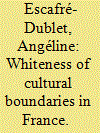

|
|
|
|
|
| Summary/Abstract |
This paper proposes to explore French cultural policy to show how the white boundary making is embedded in the ‘routine structures’ of cultural life. It takes the example of the implementation of national cultural policy as a means of seeing how the privilege of the majority operates. Against a formal insistence that the French definition of citizenship and equality does not leave room for the discussion of visible identities, it argues that immigration issues in relation to culture are relevant loci for the numerous instances of boundary drawings that it helps highlighting. Specifically, it shows how in the process of designing and implementing cultural policies, administrative officials have defined culture as artistic, universal and secular throughout the years. As a consequence of which, the privileged currently take part in the definition of artistic norms, while migration-related minorities have to justify for the social benefit of any of their artistic initiative.
|
|
|
|
|
|
|
|
|
|
|
|
|
|
|
|
| 12 |
ID:
167650
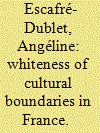

|
|
|
|
|
| Summary/Abstract |
This paper proposes to explore French cultural policy to show how the white boundary making is embedded in the ‘routine structures’ of cultural life. It takes the example of the implementation of national cultural policy as a means of seeing how the privilege of the majority operates. Against a formal insistence that the French definition of citizenship and equality does not leave room for the discussion of visible identities, it argues that immigration issues in relation to culture are relevant loci for the numerous instances of boundary drawings that it helps highlighting. Specifically, it shows how in the process of designing and implementing cultural policies, administrative officials have defined culture as artistic, universal and secular throughout the years. As a consequence of which, the privileged currently take part in the definition of artistic norms, while migration-related minorities have to justify for the social benefit of any of their artistic initiative.
|
|
|
|
|
|
|
|
|
|
|
|
|
|
|
|
| 13 |
ID:
167647
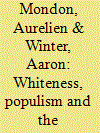

|
|
|
|
|
| Summary/Abstract |
The election of Donald Trump and the Brexit vote were widely hailed as examples of (white) working class revolts. This article examines the populist racialisation of the working class as white and ‘left behind’, and representative of the ‘people’ or ‘demos’, in the campaigns and commentaries. We argue that such constructions made race central, obscured the class make-up, allowed for the re-assertion of white identity as a legitimate political category and legitimised, mainstreamed and normalised racism and the far right. Moreover, it delegitimised Black, Minority Ethnic and immigrant experiences and interests, including working class ones. We show that the construction of the votes as (white) working class revolts, and representing the 'people' and/or 'demos', is based on a partial reading of electoral data, misrepresents the votes, stigmatises the working class, and supports an ideological purpose which maintains the racial, political and economic status quo.
|
|
|
|
|
|
|
|
|
|
|
|
|
|
|
|
| 14 |
ID:
168181
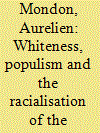

|
|
|
|
|
| Summary/Abstract |
The election of Donald Trump and the Brexit vote were widely hailed as examples of (white) working class revolts. This article examines the populist racialisation of the working class as white and ‘left behind’, and representative of the ‘people’ or ‘demos’, in the campaigns and commentaries. We argue that such constructions made race central, obscured the class make-up, allowed for the re-assertion of white identity as a legitimate political category and legitimised, mainstreamed and normalised racism and the far right. Moreover, it delegitimised Black, Minority Ethnic and immigrant experiences and interests, including working class ones. We show that the construction of the votes as (white) working class revolts, and representing the 'people' and/or 'demos', is based on a partial reading of electoral data, misrepresents the votes, stigmatises the working class, and supports an ideological purpose which maintains the racial, political and economic status quo.
|
|
|
|
|
|
|
|
|
|
|
|
|
|
|
|
| 15 |
ID:
168180
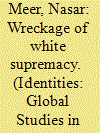

|
|
|
|
|
| Summary/Abstract |
This is how one pictures the angel of history. His face is turned toward the past. Where we perceive a chain of events, he sees one single catastrophe which keeps piling wreckage upon wreckage and hurls it in front of his feet. The angel would like to stay, awaken the dead, and make whole what has been smashed. But a storm is blowing from Paradise; it has got caught in his wings with such violence that the angel can no longer close them. This storm irresistibly propels him into the future to which his back is turned, while the pile of debris before him grows skyward. This storm is what we call progress.
|
|
|
|
|
|
|
|
|
|
|
|
|
|
|
|
|
|
|
|
|